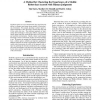1270 search results - page 104 / 254 » Dogged Learning for Robots |
MIRRORBOT
2005
Springer
14 years 3 months ago
2005
Springer
We present a virtual reality platform for developing and evaluating embodied models of cognitive development. The platform facilitates structuring of the learning agent, of its vi...
ICRA
2002
IEEE
14 years 2 months ago
2002
IEEE
It is needed for humanoid to acquire not only just a trajectory but also aim of the behavior and symbolic information during behavior development. We have proposed the mimesis sys...
ICRA
1999
IEEE
14 years 2 months ago
1999
IEEE
Mobile robot localization is the problem of determining a robot's pose from sensor data. This article presents a family of probabilisticlocalization algorithms known as Monte...
EPIA
2009
Springer
14 years 1 months ago
2009
Springer
This paper presents an approach to endow a humanoid robot with the capability of learning new objects and recognizing them in an unstructured environment. New objects are learnt, w...
AAAI
2000
13 years 11 months ago
2000
If robotic agents are to act autonomously they must have the ability to construct and reason about models of their physical environment. For example, planning to achieve goals req...

